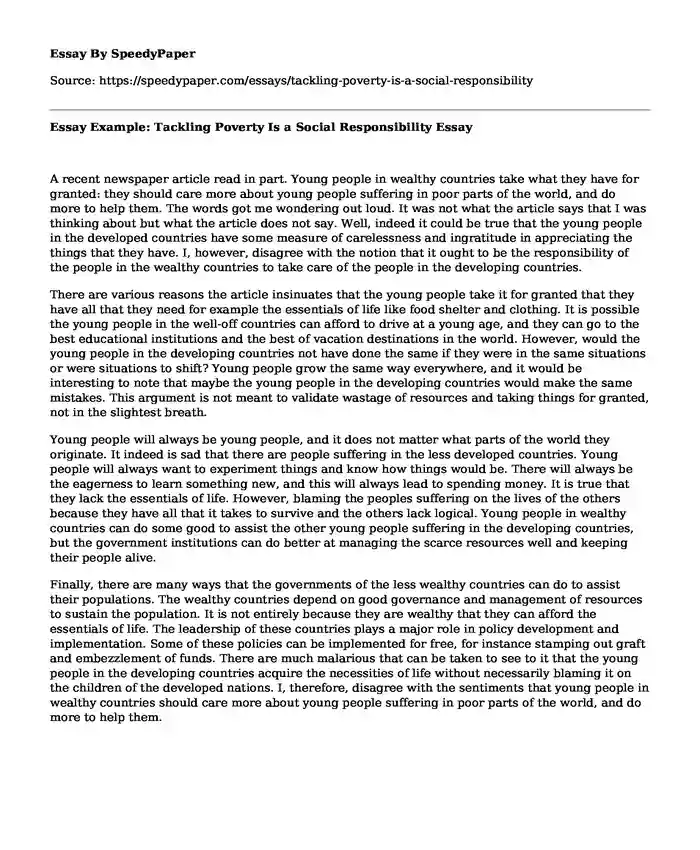
| Type of paper: | Essay |
| Categories: | Health and Social Care Social responsibility |
| Pages: | 3 |
| Wordcount: | 552 words |
A recent newspaper article read in part. Young people in wealthy countries take what they have for granted: they should care more about young people suffering in poor parts of the world, and do more to help them. The words got me wondering out loud. It was not what the article says that I was thinking about but what the article does not say. Well, indeed it could be true that the young people in the developed countries have some measure of carelessness and ingratitude in appreciating the things that they have. I, however, disagree with the notion that it ought to be the responsibility of the people in the wealthy countries to take care of the people in the developing countries.
There are various reasons the article insinuates that the young people take it for granted that they have all that they need for example the essentials of life like food shelter and clothing. It is possible the young people in the well-off countries can afford to drive at a young age, and they can go to the best educational institutions and the best of vacation destinations in the world. However, would the young people in the developing countries not have done the same if they were in the same situations or were situations to shift? Young people grow the same way everywhere, and it would be interesting to note that maybe the young people in the developing countries would make the same mistakes. This argument is not meant to validate wastage of resources and taking things for granted, not in the slightest breath.
Young people will always be young people, and it does not matter what parts of the world they originate. It indeed is sad that there are people suffering in the less developed countries. Young people will always want to experiment things and know how things would be. There will always be the eagerness to learn something new, and this will always lead to spending money. It is true that they lack the essentials of life. However, blaming the peoples suffering on the lives of the others because they have all that it takes to survive and the others lack logical. Young people in wealthy countries can do some good to assist the other young people suffering in the developing countries, but the government institutions can do better at managing the scarce resources well and keeping their people alive.
Finally, there are many ways that the governments of the less wealthy countries can do to assist their populations. The wealthy countries depend on good governance and management of resources to sustain the population. It is not entirely because they are wealthy that they can afford the essentials of life. The leadership of these countries plays a major role in policy development and implementation. Some of these policies can be implemented for free, for instance stamping out graft and embezzlement of funds. There are much malarious that can be taken to see to it that the young people in the developing countries acquire the necessities of life without necessarily blaming it on the children of the developed nations. I, therefore, disagree with the sentiments that young people in wealthy countries should care more about young people suffering in poor parts of the world, and do more to help them.
Cite this page
Essay Example: Tackling Poverty Is a Social Responsibility. (2019, Nov 12). Retrieved from https://speedypaper.com/essays/tackling-poverty-is-a-social-responsibility
Request Removal
If you are the original author of this essay and no longer wish to have it published on the SpeedyPaper website, please click below to request its removal:
- Essay Example on Principle of Finance at Samsung and Apple
- Essay Sample on Special Qualities of a Teacher
- Essay Example on Rita Dove Biography
- Literary Essay Example: The Natural as a Mirror of the Human
- Free Essay on Challenges to Work Groups
- Free Essay. Violence Against Women Worldwide
- Paper Example. The Generational Gap
Popular categories




